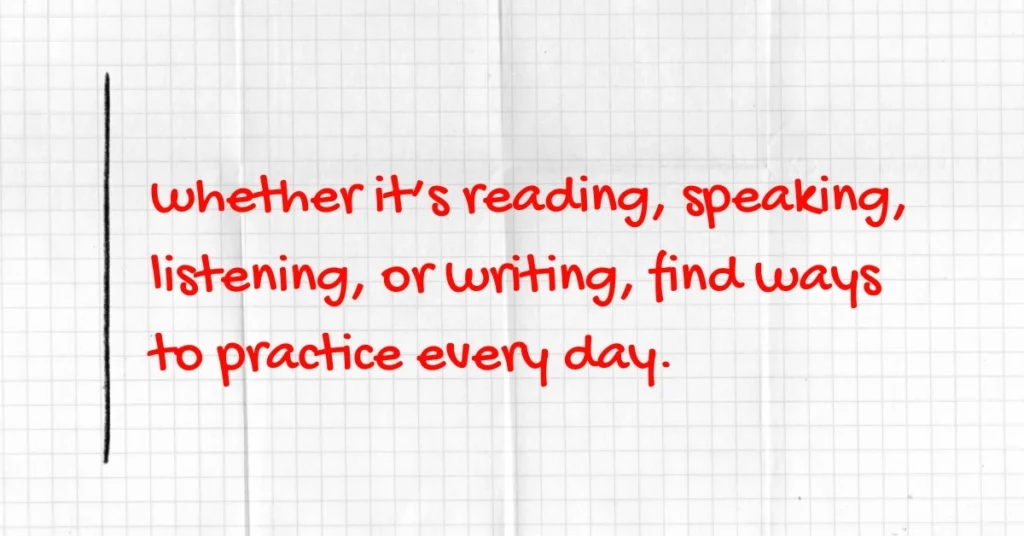How to think in English: Learning a new language can be both exciting and challenging. One of the key elements that will help you become truly fluent in English is learning how to think in English, rather than constantly translating from your native language.
This mental shift will not only improve your speaking and writing skills but also help you feel more confident when communicating.
17-Step Roadmap to Gaining Fluency in English

The more you practice thinking in English, the easier and more natural it will become. Here’s how you can start changing the way you think and enhance your English fluency every day.
1. Name the Objects Around You
The first step in learning to think in English is to start associating the things around you with their English names. When you wake up in the morning, try to identify everything in your room in English. For example, “This is my bed, this is my chair, this is the window.” By labeling the objects in your environment, you start building a mental dictionary, helping you to recall words instantly when you need them.
This is an easy and effective way to begin immersing yourself in the language without any pressure.
2. Think in Simple Sentences

When you’re trying to think in English, keep your thoughts simple. At first, it might be difficult to form complex sentences, so start by thinking in basic sentences. For example, instead of thinking “I wonder what time the bus arrives at the station,” try thinking “The bus is coming soon.”
The simpler you keep your thoughts, the easier it will be to think in English without overloading your brain.
3. Have Small Conversations with Yourself
One of the best ways to improve your speaking skills is to practice talking to yourself. Don’t be shy! You can talk about anything: what you did during the day, what you’re planning to do next, or how you’re feeling. For example, “I’m going to the store today,” or “I’m feeling happy because it’s sunny.”
The more you speak out loud, even if it’s just to yourself, the better you’ll become at forming sentences naturally in English.
4. Change One of Your Everyday Things to English
Another great way to immerse yourself in English is by changing something you interact with daily into English. This could be your phone, your computer, or even the labels on products you use. For example, change the language setting on your phone to English.
You’ll start encountering English words all the time, and this constant exposure will help you learn new vocabulary.
5. Stop Translating in Your Head
One of the biggest obstacles in thinking in English is the habit of translating everything back into your native language. This often slows down your ability to speak fluently and can make you feel disconnected from the language.
Read: 100 Daily Sentences – BOOST Your English Speaking
Instead of translating, focus on understanding the meaning of words in English.
Let go of the need to translate and allow the language to flow naturally.
6. Find a Friend to Practice Speaking With
Speaking with someone else who is also learning English—or even a fluent English speaker—is one of the best ways to improve. Find a conversation partner or a language exchange buddy. You can practice small talks about your day, ask questions, and share experiences in English.
The more you practice speaking, the more confident you will become. Plus, your partner might teach you new expressions and phrases you can use.
7. Dedicate at Least 5 Minutes Every Day to English
Learning English, like any new skill, requires consistent practice. Dedicate at least five minutes every day to practicing your English skills. This could be listening to a short podcast, reading a news article, or writing a quick journal entry.
Small, consistent efforts are more effective than occasional long study sessions.
8. Listen to English Songs
Music is a fun and engaging way to improve your English. Listen to English songs and try to understand the lyrics. You can even sing along to practice your pronunciation. Pay attention to how the singers use expressions, phrases, and slang.
Over time, you’ll notice how English sounds more natural to you, and you may even pick up new vocabulary that you can use in everyday conversations.
9. Watch News and Series in English Every Day
Watching the news or your favorite TV series in English is another excellent way to improve your language skills. Try to watch without subtitles at first, and then watch it again with English subtitles to reinforce the words you may have missed.
Read: 17 Advanced English Phrases for Everyday Speaking
If you’re a fan of a particular show or genre, this will feel like a fun activity rather than studying.
It’s also a great way to hear native speakers and get used to different accents and speaking styles.
10. Spell Out Everything You Do in English
As you go about your daily tasks, try to spell them out in English. If you’re cooking, say, “I’m cutting the vegetables,” or “I’m frying the chicken.” If you’re cleaning, say, “I’m washing the dishes.” This will help you reinforce vocabulary in real-life situations.
It’s a great way to build connections between the words you’re learning and the activities you’re doing.
11. Stop Being Afraid to Make a Mistake

Mistakes are a natural part of learning a language. Don’t be afraid to make them. Every time you make a mistake, you learn something new. If you say the wrong word or form a sentence incorrectly, just correct yourself and keep going.
Remember, language is about communication, not perfection.
12. Stop Treating Yourself Like a Student—Become an English Speaker
A common mistake language learners make is viewing themselves as students forever. Instead, start thinking of yourself as an English speaker, even if you’re still learning. Try to adopt a confident attitude and treat speaking English as a normal part of your life.
The more you embrace this mindset, the more natural it will feel.
13. Don’t Overuse Grammar
While grammar is important, overthinking grammar rules can hold you back from speaking freely. Don’t get stuck on whether a sentence is perfect or not. Focus on communicating your ideas, and if necessary, you can refine your grammar later.
The goal is to get comfortable expressing yourself.
14. Think Simpler
When learning a new language, there’s no need to complicate things. Keep your thoughts and speech simple. Think of how children learn language—they start by using basic words and sentences. As you progress, your vocabulary and sentence structure will naturally become more complex.
But in the beginning, simplicity is key.
15. Imagine You’re a Child Learning Your First Language
Try to look at learning English from the perspective of a child learning their first language. Children don’t worry about grammar rules or pronunciation; they focus on communicating and understanding. Adopt this mindset and allow yourself to make mistakes without fear.
It’s the best way to learn.
16. Practice, Practice, Practice!

There’s no shortcut to fluency—it takes time and practice. The more you practice, the more comfortable you’ll become. Whether it’s reading, speaking, listening, or writing, find ways to practice every day.
The key to becoming fluent in English is simply practicing regularly.
17. Have Fun Doing It!
Lastly, learning English should be fun! Try to find activities that you enjoy, whether it’s listening to music, watching movies, or reading books. When you enjoy the process, it won’t feel like a chore.
Read: 10 Great Everyday English Idioms for Speaking
You’ll naturally become more motivated and excited to improve.
Wrap-up
By following these steps, you can start thinking in English and make great strides in your language-learning journey. It may feel challenging at first, but the more you immerse yourself in the language, the easier it will become. Remember, the key is consistency, practice, and a positive mindset. Keep going, and enjoy the process! Happy learning!
Explore More
- Well vs. Good: What’s the Difference and When to Use Each
 What is the difference between good and well. These two words might seem similar, but they’re used in …
What is the difference between good and well. These two words might seem similar, but they’re used in … - Have You vs. Did You: What’s the Real Difference?
 Imagine you’re meeting a friend in the evening, and you want to ask if they …
Imagine you’re meeting a friend in the evening, and you want to ask if they … - Difference Between I have had and I had had
 Have you ever found yourself tangled in the web of “I have had” and “I …
Have you ever found yourself tangled in the web of “I have had” and “I … - Understanding and Fixing Sentence Fragments
 In this lesson, you will be learning about sentence fragments. Ever written something that looks like …
In this lesson, you will be learning about sentence fragments. Ever written something that looks like … - Synonyms, Antonyms, and Homophones: Boost Your Vocabulary!
 Are you ready to take your English speaking skills to the next level? One of …
Are you ready to take your English speaking skills to the next level? One of …




